Blind, Black and Blue
The blind musicians at the heart of an American musical revolution.
In the early 20th Century, a generation of musicians redefined the life experience of black and of disabled Americans. Drawing on the indignities of slavery and segregation, Blind “Willie” McTell, Blind Willie Johnson, Blind Boy Fuller and the Reverend Gary Davis, among many others, first earned a living playing on the streets, before taking their distinctive blues sound into the recording studio. Many of them became big stars and some were lucky enough to enjoy a second period of success in the folk-blues renaissance of the 1960s.
Their blindness was no coincidence. The disability was seen by many in wider society as a curse, a belief which reduced their chances of earning a conventional living – already hampered by being black in a severely segregated country – even further. And for the poor, with no access to health care, relatively minor conditions such as conjunctivitis could lead to loss of sight. Music was a means of feeding the family and the influence of these modern pioneers can still be heard today.
As a blind person himself, �鶹�� correspondent, Gary O’Donoghue was eager to find out more about the music and the men responsible for a musical revolution.
Produced by Lee Kumutat who is also blind, as is the sound engineer who mixed it, Peter Bosher.
(Photo: Gary O’Donoghue crouches by the headstone of Blind Willie McTell)
Last on
More episodes
Previous
Broadcasts
- Sat 28 Apr 2018 18:06GMT�鶹�� World Service except News Internet
- Sun 29 Apr 2018 11:06GMT�鶹�� World Service except News Internet
- Sat 1 Sep 2018 13:06GMT�鶹�� World Service except News Internet
- Sun 2 Sep 2018 19:06GMT�鶹�� World Service except East and Southern Africa, News Internet & West and Central Africa
- Sun 2 Sep 2018 21:06GMT�鶹�� World Service East and Southern Africa & West and Central Africa only

